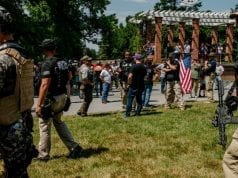
 Some 1,200 Indonesian convicts are on the run from three different detention facilities in devastated Sulawesi after the region was rocked by a powerful earthquake and tsunami, a justice ministry official said Monday The warning came as volunteers began to dig mass graves for the bodies of more than 1,000 victims in an attempt to prevent an outbreak of disease. Four days after a 7.5 magnitude quake triggered a tsunami that slammed into the city of Palu, the country also appealed for international help as it struggled to cope with the sheer scale of the disaster. At least 832 people so far are confirmed dead after the waves battered the Sulawesi coastline but the toll was expected to rise sharply as rescue workers reached areas that had been cut off in the disaster. Authorities said prisoners had seized on the opportunity to break free. One prison in Palu city – built to hold just 120 people – saw most of its 581 inmates storm past guards and escape to freedom through walls collapsed by the massive shake. Inmates had also fled from another overcapacity facility in Palu by breaking down its main door and another in Donggala, an area also hit by the disaster. The Donggala jail was set on fire and all 343 inmates were now on the run, Utami said. Fears are growing of a humanitarian emergency as supplies of medicine, food and water run low. A shortage of heavy equipment has left rescuers struggling to reach desperate victims calling out from the ruins of collapsed buildings. President Joko Widodo opened the door to the dozens of international aid agencies and NGOs lined up to provide live-saving assistance. “Last night, President @jokowi authorised us to accept international help for urgent disaster-response & relief,” senior government official Tom Lembong wrote on Twitter, asking rescuers to contact him directly via his account and email. Widodo said “there are many places where the evacuation couldn't be done because of the absence of heavy equipment, but last night equipment started to arrive in Palu”. “We'll send as much food supplies as possible today with Hercules planes, directly from Jakarta, there are several,” he said, referring to C-130 military transport aircraft. How Palu became a death trap – and why magnitude of waves was 'surprising' At Poboya – in the hills above the devastated seaside city of Palu – volunteers dug a 100 metre-long grave to bury the dead, with instructions to prepare for 1,300 victims to be laid to rest. Authorities have announced a 14-day state of emergency amid fears of a disease outbreak caused by decomposing bodies. In Balaroa, a Palu suburb once home to a housing complex, the scale of the damage was apparent. A wasteland of flattened trees, shards of concrete, twisted metal roofing, doorframes and mangled furniture stretched out into the distance. The national search and rescue agency said one woman was rescued overnight in the suburb, where houses were swallowed up when the earthquake caused soil liquefaction. Rescuers are racing against the clock and a lack of equipment to save those still trapped in the rubble, with up to 60 people feared to be underneath one Palu hotel alone. Two survivors have been plucked from the 80-room Hotel Roa-Roa, Indonesia's search and rescue agency said, and there could still be more alive. Desperate survivors turned to looting shops for basics like food, water and fuel as police looked on, unwilling or unable to intervene. “There has been no aid, we need to eat. We don't have any other choice, we must get food,” one man in Palu told AFP as he filled a basket with goods from a nearby store. Many have spent the last few days desperately searching for loved ones while dealing with the trauma of the disaster. One woman was lucky to survive. Dwi Rahayu was working at a cafe stall near the festival on the beach with her husband and two boys when the waves struck. Shortly after shrugging off the earthquake, the first wave washed around them and she heard her husband shouting: “Run! Run! Big wave!” She grabbed one of her boys and ran but she was too late. Swept several hundred metres away by the water, they were slammed into a wall which later gave way. She fell unconscious and woke up in hospital, with both legs broken. Miraculously, her family had all survived. Fandi, a 22 year-old who was also working on the beach, was not so lucky. There were 12 family members who went to the beach, including his parents, aunt and uncle, and brothers and sister and his new family, his wife and his only son. He took his son back home late in the afternoon, only to learn later of the tsunami. He has seen his mother's body in the hospital, while the fate of his other relatives is not yet known. Indonesian earthquake and tsunami Others have centred their search for loved ones around open-air morgues, where the dead lay in the baking sun – waiting to be claimed, waiting to be named. As dire as the situation in Palu is, it was at least clear. In outlying areas, the fate of thousands is still unknown. Indonesia's Metro TV broadcast aerial footage from a coastal community in Donggala, close to the epicentre of the quake. Some waterfront homes appeared crushed but a resident said most people fled to higher ground after the quake struck. “When it shook really hard, we all ran up into the hills,” a man identified as Iswan told the TV. Yenni Suryani, of Catholic Relief Services, said devastated infrastructure was hampering rescue efforts. “Humanitarian groups are struggling to get people into affected areas,” she said. The main airport at Palu was damaged, landslides had cut off key roads while “power is out almost everywhere,” she added.
Some 1,200 Indonesian convicts are on the run from three different detention facilities in devastated Sulawesi after the region was rocked by a powerful earthquake and tsunami, a justice ministry official said Monday The warning came as volunteers began to dig mass graves for the bodies of more than 1,000 victims in an attempt to prevent an outbreak of disease. Four days after a 7.5 magnitude quake triggered a tsunami that slammed into the city of Palu, the country also appealed for international help as it struggled to cope with the sheer scale of the disaster. At least 832 people so far are confirmed dead after the waves battered the Sulawesi coastline but the toll was expected to rise sharply as rescue workers reached areas that had been cut off in the disaster. Authorities said prisoners had seized on the opportunity to break free. One prison in Palu city – built to hold just 120 people – saw most of its 581 inmates storm past guards and escape to freedom through walls collapsed by the massive shake. Inmates had also fled from another overcapacity facility in Palu by breaking down its main door and another in Donggala, an area also hit by the disaster. The Donggala jail was set on fire and all 343 inmates were now on the run, Utami said. Fears are growing of a humanitarian emergency as supplies of medicine, food and water run low. A shortage of heavy equipment has left rescuers struggling to reach desperate victims calling out from the ruins of collapsed buildings. President Joko Widodo opened the door to the dozens of international aid agencies and NGOs lined up to provide live-saving assistance. “Last night, President @jokowi authorised us to accept international help for urgent disaster-response & relief,” senior government official Tom Lembong wrote on Twitter, asking rescuers to contact him directly via his account and email. Widodo said “there are many places where the evacuation couldn't be done because of the absence of heavy equipment, but last night equipment started to arrive in Palu”. “We'll send as much food supplies as possible today with Hercules planes, directly from Jakarta, there are several,” he said, referring to C-130 military transport aircraft. How Palu became a death trap – and why magnitude of waves was 'surprising' At Poboya – in the hills above the devastated seaside city of Palu – volunteers dug a 100 metre-long grave to bury the dead, with instructions to prepare for 1,300 victims to be laid to rest. Authorities have announced a 14-day state of emergency amid fears of a disease outbreak caused by decomposing bodies. In Balaroa, a Palu suburb once home to a housing complex, the scale of the damage was apparent. A wasteland of flattened trees, shards of concrete, twisted metal roofing, doorframes and mangled furniture stretched out into the distance. The national search and rescue agency said one woman was rescued overnight in the suburb, where houses were swallowed up when the earthquake caused soil liquefaction. Rescuers are racing against the clock and a lack of equipment to save those still trapped in the rubble, with up to 60 people feared to be underneath one Palu hotel alone. Two survivors have been plucked from the 80-room Hotel Roa-Roa, Indonesia's search and rescue agency said, and there could still be more alive. Desperate survivors turned to looting shops for basics like food, water and fuel as police looked on, unwilling or unable to intervene. “There has been no aid, we need to eat. We don't have any other choice, we must get food,” one man in Palu told AFP as he filled a basket with goods from a nearby store. Many have spent the last few days desperately searching for loved ones while dealing with the trauma of the disaster. One woman was lucky to survive. Dwi Rahayu was working at a cafe stall near the festival on the beach with her husband and two boys when the waves struck. Shortly after shrugging off the earthquake, the first wave washed around them and she heard her husband shouting: “Run! Run! Big wave!” She grabbed one of her boys and ran but she was too late. Swept several hundred metres away by the water, they were slammed into a wall which later gave way. She fell unconscious and woke up in hospital, with both legs broken. Miraculously, her family had all survived. Fandi, a 22 year-old who was also working on the beach, was not so lucky. There were 12 family members who went to the beach, including his parents, aunt and uncle, and brothers and sister and his new family, his wife and his only son. He took his son back home late in the afternoon, only to learn later of the tsunami. He has seen his mother's body in the hospital, while the fate of his other relatives is not yet known. Indonesian earthquake and tsunami Others have centred their search for loved ones around open-air morgues, where the dead lay in the baking sun – waiting to be claimed, waiting to be named. As dire as the situation in Palu is, it was at least clear. In outlying areas, the fate of thousands is still unknown. Indonesia's Metro TV broadcast aerial footage from a coastal community in Donggala, close to the epicentre of the quake. Some waterfront homes appeared crushed but a resident said most people fled to higher ground after the quake struck. “When it shook really hard, we all ran up into the hills,” a man identified as Iswan told the TV. Yenni Suryani, of Catholic Relief Services, said devastated infrastructure was hampering rescue efforts. “Humanitarian groups are struggling to get people into affected areas,” she said. The main airport at Palu was damaged, landslides had cut off key roads while “power is out almost everywhere,” she added.








